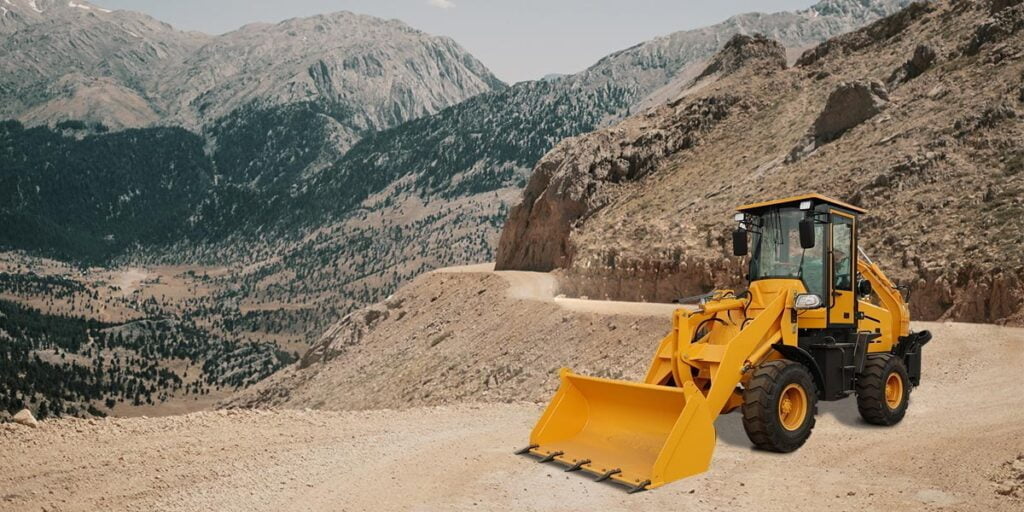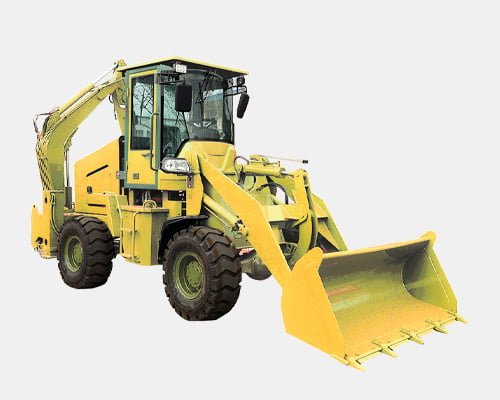Einführung

In der hektischen Welt des Bauwesens und der Landschaftsgestaltung sind kompakte Lader sind unverzichtbare Wirtschaftsgüter. Die Suche nach qualitativ hochwertigen Kompaktladern zum Verkauf kann jedoch eine entmutigende Aufgabe inmitten einer Vielzahl von Optionen sein. In diesem umfassenden Leitfaden geben wir Ihnen wertvolle Einblicke und praktische Tipps, damit Sie sich beim Kauf von Kompaktladern sicher und gut informiert bewegen können. Egal, ob Sie ein erfahrener Bauunternehmer oder ein Erstkäufer sind, dieser Leitfaden ist Ihr Wegweiser, um den perfekten Kompaktlader für Ihre Bedürfnisse zu finden.
Kompaktlader verstehen
Bevor Sie sich zum Kauf entschließen, sollten Sie unbedingt das Wesen der Kompaktlader und ihre vielfältigen Einsatzmöglichkeiten kennenlernen. In diesem Abschnitt befassen wir uns eingehend mit den grundlegenden Aspekten von Kompaktladern, ihrer komplexen Konstruktion, ihrer dynamischen Funktionalität und dem umfangreichen Repertoire an Aufgaben, die sie mühelos bewältigen. Kompaktlader erweisen sich als treue Verbündete im Baugewerbe und in der Landwirtschaft und zeichnen sich durch ihre beispiellose Vielseitigkeit und Leistungsfähigkeit bei den unterschiedlichsten Projekten aus.
Brillantes Design: Kompaktlader sind der Inbegriff von technischem Einfallsreichtum und zeichnen sich durch ihre kompakte Bauweise und wendige Manövrierfähigkeit aus. Ihr schlankes Design ermöglicht eine nahtlose Navigation durch enge Räume und unwegsames Gelände und macht sie zu unverzichtbaren Geräten bei Projekten, bei denen Platzmangel und Mobilität von größter Bedeutung sind.
Funktionale Beherrschung: Das Herzstück dieser Maschinen ist ein robuster Ladearm und ein Schaufelanbau, mit dem Kompaktlader eine Vielzahl von Aufgaben mit Finesse und Effizienz erledigen können. Vom Heben und Laden schwerer Materialien bis hin zum Ausheben und Schieben von Erde sind diese Maschinen bemerkenswert vielseitig und passen sich mühelos an die Anforderungen verschiedener Bau- und Landwirtschaftsarbeiten an.
Vielseitige Anwendungen: Kompaktlader entpuppen sich als wahre Arbeitstiere, die ihre Fähigkeiten für eine Vielzahl von Anwendungen in den Bereichen Erdbewegung, Materialtransport, Landschaftsbau und Schneeräumung einsetzen. Bei Bauprojekten übernehmen sie Aufgaben, die vom Ausheben von Gräben und Planieren der Oberfläche bis zum Auffüllen und Bewegen von Zuschlagstoffen reichen. In der Landwirtschaft erleichtern sie Aufgaben wie das Be- und Entladen von Produkten, die Bodenbearbeitung und den Transport der geernteten Pflanzen.
Faktoren, die beim Kauf von Kompaktladern zu berücksichtigen sind
Die Auswahl des perfekten Kompaktladers erfordert eine umfassende Bewertung zahlreicher Faktoren. In diesem Abschnitt gehen wir auf die Feinheiten dieser Überlegungen ein und beleuchten kritische Aspekte wie den Ladertyp, die Motorleistung und die Betriebskapazität. Wenn Sie sich mit diesen Variablen eingehend befassen und sie mit Ihren individuellen Projektanforderungen und finanziellen Parametern in Einklang bringen, können Sie Ihre Optionen effektiv optimieren und eine vernünftige Entscheidung treffen, die perfekt auf Ihre Bedürfnisse und Ziele abgestimmt ist.
Lader-Typ: Kompaktlader oder Kompakt-Raupenlader Die erste Entscheidung, die Sie bei der Wahl eines Kompaktladers treffen müssen, ist die, ob ein Kompaktlader oder ein Kompakt-Raupenlader Ihren Anforderungen am besten entspricht. Kompaktlader zeichnen sich durch ihre Manövrierfähigkeit und Vielseitigkeit auf ebenem, hartem Untergrund aus, während Kompaktraupenlader auf unebenem oder weichem Terrain eine bessere Traktion und Stabilität bieten. Die Beurteilung der Bedingungen auf Ihrer Baustelle und der geplanten Anwendungen hilft Ihnen bei dieser Entscheidung.
Motorleistung:Die Motorleistung eines Kompaktladers wirkt sich direkt auf seine Leistungsfähigkeiten aus. Motoren mit höherer Leistung bieten eine größere Schub- und Hubkraft, sodass die Maschine auch anspruchsvollere Aufgaben mit Leichtigkeit bewältigen kann. Vergleichen Sie die PS-Zahlen der verschiedenen Modelle mit Ihren Arbeitsanforderungen, um optimale Leistung und Effizienz zu gewährleisten.
BetriebskapazitätDie Arbeitskapazität bezieht sich auf das maximale Gewicht, das ein Kompaktlader sicher heben und transportieren kann. Es ist wichtig, die Betriebskapazität des Laders an die Anforderungen Ihrer spezifischen Aufgaben anzupassen, um sicherzustellen, dass er die Materialien und Lasten, mit denen Sie arbeiten werden, effektiv handhaben kann. Berücksichtigen Sie Faktoren wie die Größe der Nutzlast, die Materialdichte und die Häufigkeit des Einsatzes, wenn Sie die geeignete Betriebskapazität für Ihre Anforderungen bestimmen.
Vergleichende Analyse: Bewertung von Kompaktladermodellen

Da der Markt mit einer Vielzahl von Kompaktladermodellen überfüllt ist, müssen anspruchsvolle Kunden eine gründliche vergleichende Analyse der Merkmale und Spezifikationen durchführen. In diesem Segment begeben wir uns auf eine Entdeckungsreise und geben einen umfassenden Überblick über die beliebten Kompaktladermodelle geschätzter Hersteller. Mithilfe einer aufschlussreichen Seite-an-Seite-Vergleichstabelle beleuchten wir die wichtigsten Attribute wie Motorleistung, Schaufelkapazität, Hubkapazität und Durchflussmenge der Zusatzhydraulik. Diese umfassende Untersuchung ermöglicht es Ihnen als Verbraucher, sich in der komplizierten Landschaft der Kompaktladeroptionen sicher und klar zurechtzufinden und ein Modell auszuwählen, das Ihren individuellen Anforderungen und Wünschen gerecht wird.
Wo Sie hochwertige Kompaktlader zum Verkauf finden
Sobald Sie die gewünschten Spezifikationen ermittelt haben, müssen Sie seriöse Anbieter finden, die hochwertige Kompaktlader zum Kauf anbieten. In diesem Abschnitt stellen wir Ihnen verschiedene Möglichkeiten zum Kauf von Kompaktladern vor, darunter Vertragshändler, Online-Marktplätze und Maschinenauktionen. Außerdem geben wir Tipps zur Überprüfung von Verkäufern und zur Sicherstellung der Echtheit und Zuverlässigkeit der angebotenen Maschinen.
| Weg zum Einkaufen | Beschreibung |
|---|---|
| Autorisierte Händler | Die Vertragshändler bieten fabrikneue Kompaktlader direkt vom Hersteller an und gewährleisten so Qualität, Garantie und Kundendienst. |
| Online-Marktplätze | Online-Marktplätze wie eBay, MachineryTrader und EquipmentTrader bieten eine große Auswahl an neuen und gebrauchten Kompaktladern von verschiedenen Anbietern weltweit. |
| Ausrüstung Auktionen | Maschinenauktionen bieten die Möglichkeit, Kompaktlader zu wettbewerbsfähigen Preisen zu erwerben, wobei sowohl neue als auch gebrauchte Optionen über Bieterverfahren erhältlich sind. |
| Private Verkäufer | Private Verkäufer können Kompaktlader über Kleinanzeigen, Websites oder Social-Media-Plattformen zum Verkauf anbieten, was zwar Kosteneinsparungen ermöglicht, aber eine gründliche Überprüfung erfordert. |
| Vermietungsunternehmen | Einige Vermietungsunternehmen verkaufen ihre gebrauchten Kompaktlader und bieten gut gewartete Maschinen mit bekannter Einsatzhistorie zu wettbewerbsfähigen Preisen an. |
| Hersteller-Websites | Auf den Websites der Hersteller finden Sie häufig Informationen zu Vertragshändlern, neuen Modellen und Sonderangeboten, die eine wertvolle Hilfe bei der Recherche und beim Kauf darstellen. |
Schlussfolgerung
Zusammenfassend lässt sich sagen, dass die Suche nach qualitativ hochwertigen Kompaktladern eine gründliche Recherche, eine sorgfältige Prüfung der Spezifikationen und eine gewissenhafte Bewertung der Verkäufer erfordert. Mit den Erkenntnissen und Tipps in diesem Leitfaden können Sie sich sicher durch den Kaufprozess bewegen und eine fundierte Entscheidung treffen, die Ihren Anforderungen und Ihrem Budget gerecht wird. Ganz gleich, ob Sie Ihren Maschinenpark aufrüsten oder in Ihren ersten Kompaktlader investieren möchten, dieser Leitfaden gibt Ihnen das Wissen und die Werkzeuge an die Hand, um die perfekte Maschine für Ihre Projekte zu finden.
FAQ
F: Was sind Kompaktlader, und wofür werden sie hauptsächlich eingesetzt?
A: Kompaktlader sind vielseitige Baumaschinen, die häufig für Erdarbeiten, Materialtransport, Landschaftsbau und verschiedene andere Aufgaben eingesetzt werden. Es gibt sie in zwei Haupttypen: Kompaktlader und Kompakt-Raupenlader. Kompaktlader werden aufgrund ihrer Wendigkeit, Vielseitigkeit und Effizienz im Baugewerbe, in der Landwirtschaft, im Landschaftsbau, bei der Schneeräumung und in vielen anderen Branchen eingesetzt.
F: Welche Faktoren sollte ich beim Kauf eines Kompaktladers berücksichtigen?
A: Beim Kauf eines Kompaktladers sollten mehrere Faktoren berücksichtigt werden, darunter der Typ des Laders (Kompaktlader oder Kompaktraupenlader), die Motorleistung, die Betriebskapazität, die Hubhöhe, die hydraulischen Möglichkeiten, die Kompatibilität der Anbaugeräte und die Gesamtbetriebskosten. Die Bewertung dieser Faktoren in Bezug auf Ihre spezifischen Anforderungen und Ihr Budget hilft Ihnen, eine fundierte Entscheidung zu treffen.
F: Wie kann ich die Qualität eines zum Verkauf stehenden Kompaktladers bestimmen?
A: Um die Qualität eines Kompaktladers zu beurteilen, müssen verschiedene Faktoren wie sein Zustand, seine Wartungshistorie, seine Betriebsstunden und seine Gesamtleistung untersucht werden. Außerdem ist es wichtig, kritische Komponenten wie den Motor, die Hydrauliksysteme, die Reifen oder Raupen und die Anbaugeräte zu überprüfen. Die Zusammenarbeit mit seriösen Verkäufern und das Anfordern von Inspektionen der Ausrüstung können ebenfalls eine Qualitätsgarantie bieten.
